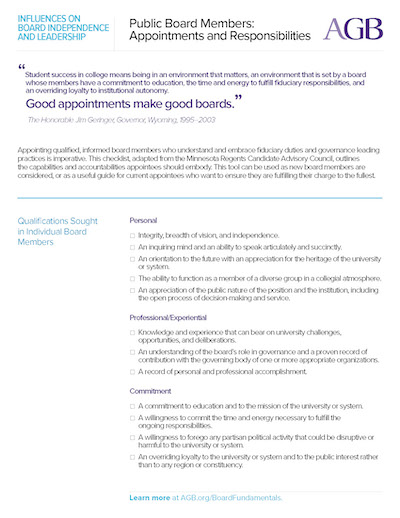
The selection of qualified and well-informed public university board members is essential to foster effective governance and advance the mission of public universities and systems. Board appointees must possess the integrity, commitment, and knowledge necessary to navigate complex challenges and opportunities in the higher education sector, while upholding their fiduciary duties and promoting the public interest. This checklist, adapted from the Minnesota Regent Candidate Advisory Council, provides a comprehensive framework and selection criteria for evaluating potential candidates for public university governing board service. It serves as a practical tool for identifying individuals who embody the qualifications, professional experience, and dedication required for effective board service. Whether used in the appointment process or as a guide for current appointees, this resource underscores the critical role of trustees and regents in shaping the future of higher education.
“Student success in college means being in an environment that matters, an environment that is set by a board whose members have a commitment to education, the time and energy to fulfill fiduciary responsibilities, and an overriding loyalty to institutional autonomy. Good appointments make good boards.”
The Honorable Jim Geringer, Governor, Wyoming, 1995–2003
Personal
- Integrity, breadth of vision, and independence.
- An inquiring mind and an ability to speak articulately and succinctly.
- An orientation to the future with an appreciation for the heritage of the university or system.
- The ability to function as a member of a diverse group in a collegial atmosphere.
- An appreciation of the public nature of the position and the institution, including the open process of decision-making and service.
Professional/Experiential
- Knowledge and experience that can bear on university challenges, opportunities, and deliberations.
- An understanding of the board’s role in governance and a proven record of contribution with the governing body of one or more appropriate organizations.
- A record of personal and professional accomplishment.
Commitment
- A commitment to education and to the mission of the university or system.
- A willingness to commit the time and energy necessary to fulfill the ongoing responsibilities.
- A willingness to forego any partisan political activity that could be disruptive or harmful to the university or system.
- An overriding loyalty to the university or system and to the public interest rather than to any region or constituency.
Responsibilities of Individual Trustees and Regents
- Seek to be fully informed about the university or system.
- Understand the responsibilities of the university or system in addressing the public interest and public good.
- Understand the mission of the university or system and where it fits into the overall state higher education policy agenda.
- Support positive change and responsiveness of higher education while being cognizant that preserving tradition, culture, and long-term stability is tantamount.
- Speak one’s mind at board meetings, but support policies and programs once established.
- Understand that the board’s responsibility is policymaking and not involvement in administration or the management process.
- Strengthen and sustain the chief executive while being an active, energetic, and inquisitive board member exercising critical judgment on policy matters.
- Communicate promptly any significant concern to the chief executive and board chair.
- Defend the autonomy and independence of the college, university, or system.
- Maintain an overriding loyalty to the entire college, university, or system rather than to any part of it or constituency within it.
- Represent all the people of the state and no particular interest, community, or constituency.
- Help enhance the public image of the college, university, or university system and the board.
- Recognize that authority resides with the board as a whole and not with individual members.
- Recognize that the president or chancellor is the primary spokesperson for the institution or university system, and the chair of the board is the only other person authorized to speak for the board.
- Foster openness and trust among the board, administration, faculty, students, state government, and the public.
- Maintain a respect for the opinions of one’s colleagues and a proper restraint in criticism of colleagues and officers.
- Recognize that no board member should request actions that violate written policies, rules, and regulations of the board or the institution or make inappropriate requests for special perks or privileges.
- Maintain the highest ethical standards and address personal conflicts of interest.
A Note on the Appointment Process
To assist with university and system board appointments, several states have external screening committees to review candidates’ qualifications. They include: Hawaii, Minnesota, Massachusetts, North Dakota, and Virginia.

